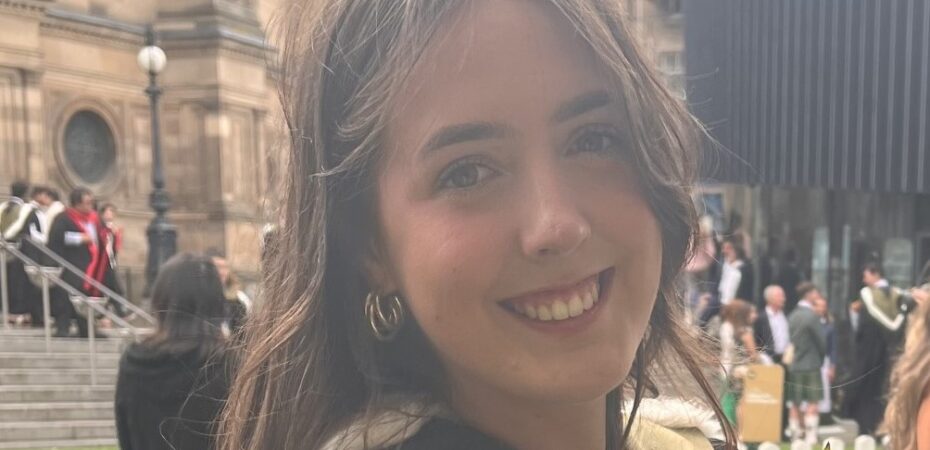We are delighted to have Mia McMillan, Graduate Software Engineer at Skyscanner, speaking at our “Where can my tech and data skills take me?” session as part of our Careers in Tech and Data Fair on Wednesday, 28th February. Before she comes onto campus, Mia gives a great insight into life after graduation and joining Skyscanner…
Hi Mia, can you tell us a bit about your current role?
In September 2023, I began working for Skyscanner as a Graduate Software Engineer having graduated from the University of Edinburgh with a joint degree in Artificial Intelligence and Computer Science. I am on a two-year Graduate Development Programme that consists of 4 rotations around various areas of the business including:
- App Development
- Frontend
- Backend
- Data
- Product Development.
I am currently in my first rotation in Data. This consists of working to produce new data, creating tests for our programmes, identifying and fixing any anomalies or bugs within the data, and working with others in the team to brainstorm new approaches. It’s been a steep learning curve, but incredibly interesting to learn how Skyscanner operates and amazing to feel that although I have only been at the company a few months, I can make significant contributions to help the team reach its goals.
How did you find out about Skyscanner?
In February 2023, whilst in my final year of university, I received an email from the Careers Service containing a bulletin of several events and opportunities that I may be interested in. Among these was an insight day hosted by Skyscanner. In all honesty, I don’t usually attend these types of events, but I am very glad I did! It provided me with such valuable insight into not only how Skyscanner operates and its values, but also lots of great career advice. I would highly recommend attending these sorts of events and keeping an eye on any opportunities through the Careers Service. It was after this insight day, that I decided to apply to their Graduate Development Programme.
What was the application process like?
I sent off my CV and Cover Letter and I was selected to complete an online programming assessment. Following this, I had a short online interview and was subsequently invited to their Discovery Day. The Discovery Day is when all the selected candidates go to Skyscanner’s office to complete their final round of interviews. The day started with some quick introductions, followed by a group task and finished off with two final interviews – the technical interview, and the behavioural interview.
What skills would you recommend students and graduates develop to best prepare themselves for similar opportunities?
I hadn’t completed internships or placements during my time at university so starting this job was a whole new experience and a big learning curve. Applying for Skyscanner was also my first experience of an interview process for a full-time job. I went into it completely blind and, in hindsight, would have focussed more on learning about how to excel in interviews, specifically behavioural ones. I would recommend looking at the STAR method and how you can apply this in interviews. Create a bank of several situations that you can use to describe how you have used different skills and the positive impact you have been able to make.
In terms of academic skills, I think the most important things to take into your technical interviews will be the knowledge of algorithms and data structures. I would focus on trying to learn or revise your knowledge about these and how you can apply them to different problems. I would also recommend looking beyond your university courses and identifying gaps in your learning that you could fill. For example, while studying, I noticed that I didn’t have deep knowledge of web development. I checked if there were courses available at the University and externally. I took an Introduction to Web Development course through Code First Girls. I identified this as a skill that can be extremely useful in industry, and even though I did the course three years ago, I still use the knowledge that I gained in my job today.
It’s great to hear that you were a member of a student society and involved in sport during your time at Edinburgh – can you tell us the benefits you gained?
Whilst technical skills are important in the interview process, I would say that the most important aspect was my ability to demonstrate that I had been involved in more than just my degree. For example, I was involved in a society called HumanEd (a humanoid robotics society) as their Head of Sponsorship, helping to land sponsorship deals, communicating with sponsors and managing contracts and expectations, as well as leading a team and delegating tasks. Although this is not directly related to the technical aspect of my job, it demonstrates that I have the transferable skills which are just as important as your technical skills. I was also involved in intramural sports, playing hockey for the informatics hockey team. This helped demonstrate to the recruiters that I had interests outside my academic studies, and is an excellent way to highlight transferable skills gained from outside of your degree. For example, I was able to evidence teamwork and organisational skills outside of an academic context.
Any final advice for our readers?
Many people will come away from university with the same degree and take similar courses. Consider what your specific set of skills are that sets you apart from the rest. Identify these and use them to your advantage. I would say, worry less about whether you have the right degree or have taken the right courses, it’s more about your passion, willingness to learn, and demonstrating that you have the skills needed to excel.
Thanks Mia.
We’re delighted to have showcased Mia’s career journey today… look out for our next #EdTechDataCareers guest blog coming soon.


